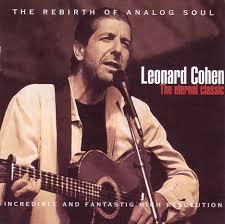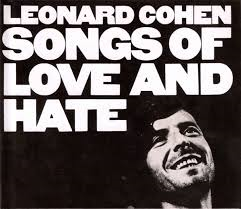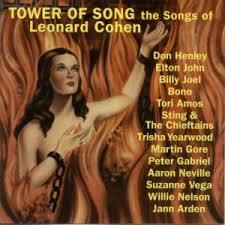Leonard Cohen was the prince of cool.
The rock 'n' roll, folk music and pop culture worlds swarm with artists, some of them great artists, who exude a measure of cool.
Leonard Cohen, who died this week at the age of 82, exuded nothing but cool.
He never had a single record reach the top 100 of the Billboard charts. His most popular album peaked at No. 63. He rarely cracked radio playlists unless someone else recorded one of his songs, like Judy Collins with "Suzanne" or Jeff Buckley with "Hallelujah."
He never had a great voice. He often performed concerts in a suit and tie. He left music for a while to become a Buddhist monk. He had a string of relationships with women, including actress Rebecca De Mornay, singer Jennifer Warnes and artist Suzanne Elrod. He never married any of them, though he had two children with Elrod.
He suffered from periodic depression, a fact that would surprise no one who listened to his songs.
Everybody knows the war has ended
Everybody knows the good guys lost
He wasn't suicidal. He just seemed to consider life a place where it was hard to get it right, and he had a brilliant way of conveying that kind of thought in verse.
Like a bird on a wire
Like a drunk in a midnight choir
I have tried in my way to be free
While he grew up in a musical family, he was in his 30s before he came to New York and decided to become a folksinger.
Up to then he'd mostly been a poet and novelist, writing books that would eventually sell hundreds of thousands of copies, but had not done so yet.
He heard Collins sing in New York. He loved her voice, she loved his songs, and that combination set him on the path he would follow for much of his last 50 years.
It's arguable that he could have secured his place with no more than one line in Collins's recording of "Suzanne," the one that goes "You've touched her perfect body with your mind."
At a time when more music fans and the embryonic FM radio world were starting to look for songs that didn't fit the top-40 mold, here was the perfect fit. It was atmospheric, melancholy and marvelously literate.
Cohen wrote many songs in subsequent years that had a very different tones, but what they all had in common was that they sounded like he was relaying a thought.
There was never a sense he was writing a song to sell it. It felt like you had been invited to sit and listen in one corner of a room while this perceptive, witty, often dark and sometimes whimsical character mused in another corner.
Did we mention that songwriters adored him?
He received many honors over the years, including a Lifetime Achievement Grammy in 2010. Cool played a role in all of them, none more than his 2008 induction into the Rock and Roll Hall of Fame.
"This is an unlikely occasion for me," he deadpanned after Lou Reed handed him the statuette.
His acceptance speech was a spoken recital of most of the verses from his 1988 tune "Tower of Song."
That's the one that begins "My friends are gone and my hair is grey." He then asks Hank Williams, "How lonely does it get?" before wrapping up with this stanza:
Now I bid you farewell, I don't know when I'll be back
There moving us tomorrow to that tower down the track
But you'll be hearing from me baby, long after I'm gone
I'll be speaking to you sweetly
From a window in the Tower of Song
You see what he's doing here. He's got the angel of death thing going on, so he's got the gloom part covered, but he's also throwing out some hope in music, a universal language he happened to speak.
Our 2024 Coverage Needs You
It's Another Trump-Biden Showdown — And We Need Your Help
The Future Of Democracy Is At Stake
Our 2024 Coverage Needs You
Your Loyalty Means The World To Us
As Americans head to the polls in 2024, the very future of our country is at stake. At HuffPost, we believe that a free press is critical to creating well-informed voters. That's why our journalism is free for everyone, even though other newsrooms retreat behind expensive paywalls.
Our journalists will continue to cover the twists and turns during this historic presidential election. With your help, we'll bring you hard-hitting investigations, well-researched analysis and timely takes you can't find elsewhere. Reporting in this current political climate is a responsibility we do not take lightly, and we thank you for your support.
Contribute as little as $2 to keep our news free for all.
Can't afford to donate? Support HuffPost by creating a free account and log in while you read.
The 2024 election is heating up, and women's rights, health care, voting rights, and the very future of democracy are all at stake. Donald Trump will face Joe Biden in the most consequential vote of our time. And HuffPost will be there, covering every twist and turn. America's future hangs in the balance. Would you consider contributing to support our journalism and keep it free for all during this critical season?
HuffPost believes news should be accessible to everyone, regardless of their ability to pay for it. We rely on readers like you to help fund our work. Any contribution you can make — even as little as $2 — goes directly toward supporting the impactful journalism that we will continue to produce this year. Thank you for being part of our story.
Can't afford to donate? Support HuffPost by creating a free account and log in while you read.
It's official: Donald Trump will face Joe Biden this fall in the presidential election. As we face the most consequential presidential election of our time, HuffPost is committed to bringing you up-to-date, accurate news about the 2024 race. While other outlets have retreated behind paywalls, you can trust our news will stay free.
But we can't do it without your help. Reader funding is one of the key ways we support our newsroom. Would you consider making a donation to help fund our news during this critical time? Your contributions are vital to supporting a free press.
Contribute as little as $2 to keep our journalism free and accessible to all.
Can't afford to donate? Support HuffPost by creating a free account and log in while you read.
As Americans head to the polls in 2024, the very future of our country is at stake. At HuffPost, we believe that a free press is critical to creating well-informed voters. That's why our journalism is free for everyone, even though other newsrooms retreat behind expensive paywalls.
Our journalists will continue to cover the twists and turns during this historic presidential election. With your help, we'll bring you hard-hitting investigations, well-researched analysis and timely takes you can't find elsewhere. Reporting in this current political climate is a responsibility we do not take lightly, and we thank you for your support.
Contribute as little as $2 to keep our news free for all.
Can't afford to donate? Support HuffPost by creating a free account and log in while you read.
Dear HuffPost Reader
Thank you for your past contribution to HuffPost. We are sincerely grateful for readers like you who help us ensure that we can keep our journalism free for everyone.
The stakes are high this year, and our 2024 coverage could use continued support. Would you consider becoming a regular HuffPost contributor?
Dear HuffPost Reader
Thank you for your past contribution to HuffPost. We are sincerely grateful for readers like you who help us ensure that we can keep our journalism free for everyone.
The stakes are high this year, and our 2024 coverage could use continued support. If circumstances have changed since you last contributed, we hope you'll consider contributing to HuffPost once more.
Already contributed? Log in to hide these messages.






